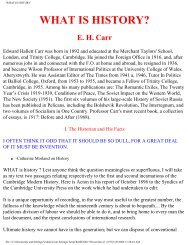The bronze age and the Celtic world - Universal History Library
The bronze age and the Celtic world - Universal History Library
The bronze age and the Celtic world - Universal History Library
You also want an ePaper? Increase the reach of your titles
YUMPU automatically turns print PDFs into web optimized ePapers that Google loves.
82 THE BRONZE AGE AND THE CELTIC WORLD<br />
accustomed on its back to drive b<strong>and</strong>s of cattle over <strong>the</strong> grassy steppes. If we may<br />
judge from <strong>the</strong> views of many of <strong>the</strong>ir modern representatives, <strong>the</strong>y despise menial<br />
work, such as ploughing <strong>the</strong> l<strong>and</strong> or digging <strong>the</strong> soil, just as <strong>the</strong>y prefer cattle <strong>and</strong> beef<br />
to sheep or mutton, <strong>and</strong> have a contempt for fish-eaters <strong>and</strong> vegetarians. <strong>The</strong> Nordic<br />
also has a natural instinct for governing <strong>and</strong> administration.<br />
As I have shown elsewhere,^ if two such peoples come into contact, <strong>and</strong> settle<br />
down toge<strong>the</strong>r, <strong>the</strong>re can be but one result : <strong>the</strong> Nordic becomes a lord <strong>and</strong> his people<br />
a privileged nobility, while <strong>the</strong> Alpine becomes eventually a serf. With a strong racial<br />
exclusiveness, or, as we call it to-day, colour prejudice, <strong>the</strong> Nordics decHne to take<br />
wives from <strong>the</strong> subject class, <strong>and</strong>, though irregular unions may in time take place,<br />
marri<strong>age</strong> is strictly forbidden. In this we have <strong>the</strong> germs of <strong>the</strong> caste system so well<br />
known in India. Similar objections to such inter-marri<strong>age</strong>s are a marked feature of<br />
<strong>the</strong> Briton throughout <strong>the</strong> empire. This custom has given rise to <strong>the</strong> strict marri<strong>age</strong><br />
regulations, which existed until lately among aU royal <strong>and</strong> many noble families in<br />
Europe, <strong>and</strong> among <strong>the</strong> descendants of <strong>the</strong> Visigoths in Spain. <strong>The</strong> marri<strong>age</strong> laws<br />
of A<strong>the</strong>ns <strong>and</strong> Rome seem to imply a similar point of view. Ano<strong>the</strong>r steppe-folk, entering<br />
a mountain zone fiUed with an eastern Alpine population, issued a similar edict, which<br />
<strong>the</strong>y credited to <strong>the</strong>ir tribal god.* Thus in <strong>the</strong> mountain zone Nordic <strong>and</strong> Alpine lived<br />
toge<strong>the</strong>r, apparently in harmony, as lord <strong>and</strong> serf, never intermarrying <strong>and</strong> rarely,<br />
if ever, mating with one ano<strong>the</strong>r.<br />
In <strong>the</strong> plain, however, <strong>the</strong> Alpines seem to have been absent, or at any rate few in<br />
number. Here we may well imagine <strong>the</strong> Nordics continued <strong>the</strong>ir nomadic existence,<br />
driving <strong>the</strong>ir cattle from one pasture to ano<strong>the</strong>r. Thus <strong>the</strong> population tended to<br />
divide into two groups, <strong>the</strong> people of <strong>the</strong> mountains <strong>and</strong> <strong>the</strong> people of <strong>the</strong> plain.<br />
When <strong>the</strong> first group of Nordics arrived in this region, both <strong>the</strong>y <strong>and</strong> <strong>the</strong>ir<br />
Alpine predecessors were ignorant of metal, but a few centuries later implements of<br />
copper began slowly to penetrate <strong>the</strong> whole area. Perhaps <strong>the</strong>se arrived from <strong>the</strong><br />
east, up <strong>the</strong> Danube valley, ei<strong>the</strong>r from Hissarhk II. or from those ^gean merchants,<br />
who, as we have seen, were trading for Transylvanian gold, or taking copper axes to<br />
<strong>the</strong> Tripolje folk. Or it may be that o<strong>the</strong>r ^Egean folk had by this time reached <strong>the</strong> head<br />
3 Peake (1922) 1. 70-72. 4 Deuteronomy vii. 3.







